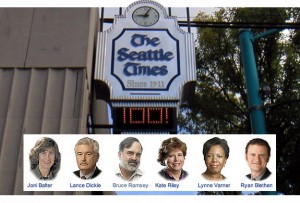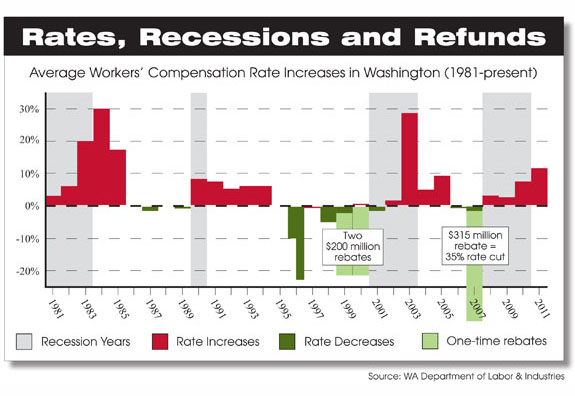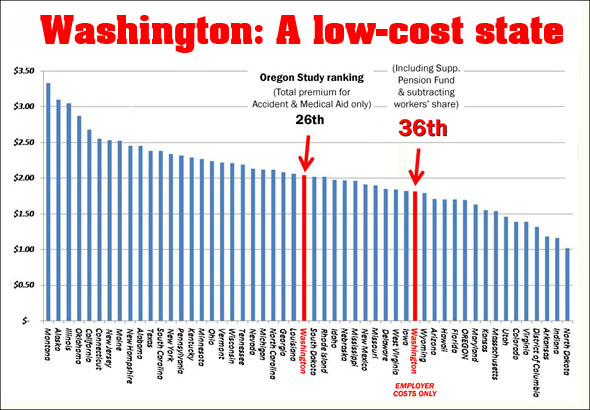OPINION
Seattle Times: 100 years of adding insult to worker injury
(UPDATED on 5/7/11 — See below.)
By Jeff Johnson
The corporate shills on the Seattle Times editorial board are so out of step with the people of Washington on the issue of workers’ compensation that it’s hard to imagine they have any credibility left on the issue at all.
For 100 years now, the Times has argued against providing insurance coverage that sufficiently compensates workers who are injured on the job. When Washington became the first state to pass a workers’ compensation law in March 1911, Times publisher Alden “Colonel” Blethen berated the Legislature “for the creation of burdensome laws and the squandering of public monies.”
 “(This new law) places a burden upon the industries of this Commonwealth that will break many of them — entirely destroy the profits of others and will prevent new capital entering the state at all,” he wrote, pioneering the rhetoric about competitiveness that continues to spew from the Times today. (Note: the law was sought by industry in exchange for workers giving up their right to sue employers over these injuries.)
“(This new law) places a burden upon the industries of this Commonwealth that will break many of them — entirely destroy the profits of others and will prevent new capital entering the state at all,” he wrote, pioneering the rhetoric about competitiveness that continues to spew from the Times today. (Note: the law was sought by industry in exchange for workers giving up their right to sue employers over these injuries.)
Since then, the Times has consistently treated the workers’ compensation system as little more than a burdensome tax on employers, as opposed to a critical safety net for working families. The experience of families who have temporarily or permanently lost their income due to work injury — families that rely on this insurance system to survive — goes unreported in the Times. Only the complaints of corporations and the organizations that lobby on their behalf merit coverage.
Last year, the Times “heartily endorsed” the corporate-funded Initiative 1082 to privatize our state-run workers’ compensation system. But Washington voters not only rejected the arguments that our system is inefficient and overly generous, they defeated I-1082 in dramatic fashion, by a margin of more than 18 points. It failed in every county in the state – red, blue and purple.
But rather than treating that decisive verdict with the deference accorded an anti-tax initiative, within days the undeterred Times was again calling for “reforms,” including legalizing lump-sum buyouts of injured workers for less than what they would otherwise receive in guaranteed benefits. After all, the Times argued, Washington is one of only five states that don’t allow this.
 Washington is also one of only four states with a publicly run system, and voters seemed to like that — a lot. In fact, Washington is a national leader in many areas of government. Voters here want state policies to be judged on their merits, NOT on whether we are outliers. Otherwise, we would have a state income tax like 43 other states and a corporate income tax like 47 other states, wouldn’t we?
Washington is also one of only four states with a publicly run system, and voters seemed to like that — a lot. In fact, Washington is a national leader in many areas of government. Voters here want state policies to be judged on their merits, NOT on whether we are outliers. Otherwise, we would have a state income tax like 43 other states and a corporate income tax like 47 other states, wouldn’t we?
Since badly losing the I-1082 debate, the Times has run four separate editorials dedicated to workers’ compensation “reform” and lump-sum buyouts. (On Nov. 10, Feb. 16, March 7, and April 19.) And today, with signs that the special session may soon conclude with its budget mission accomplished, the Times is in full panic mode to pass lump-sum buyout legislation that would cut injured workers’ benefits by an astounding $1.2 billion.
UPDATE from the editor: The Times has published yet another editorial on May 6 in support of lump-sum buyouts. The newspaper is on an absolute crusade to cut workers’ compensation benefits and strongly supports the Senate’s overtime-session strategy of holding the state budget hostage until it passes.
Today, Times editorial board member Kate Riley has published an insulting, inflammatory broadside attack against House Speaker Frank Chopp of Seattle for not bringing this legislation to a vote. Riley openly accuses Chopp and other Democratic leaders opposing this bill as being in the pockets of organized labor. After all, what other possible explanation could there be?
Perhaps these elected leaders consider the system’s instability to be a consequence of the recession, and not excessive benefits. Perhaps they have studied the history of rate increases and learned that recent hikes were actually less that those required in previous recessions. Perhaps they realized the system would be on far more solid footing today had rates not been lowered in pre-recession 2007 and a 6-month “rate holiday” granted, where employers and workers paid NOTHING for the medical portion of their insurance. That cost the system $315 million, or the 2007 equivalent of a 35% rate decrease. By comparison, the 12% rate increase in 2011 brought in $196 million.
And perhaps they recognize that it makes no sense for a special overtime legislative session to hinge on cutting $1.2 billion in workers’ comp benefits when our state has LOWER employer costs than 35 other states.
(Read these facts and more at The Stand, because you sure won’t find them in the Times.)
Yes, as hard as it may be for the cynical corporate bullies at the Times to believe, perhaps House Democratic leaders are standing by the courage of their convictions and standing up for working families.
The Times’ alarmist, uninformed rhetoric on this issue is shameless. Its impugning of the character and motives of elected officials is slanderous. And its devotion of hundreds of column inches to editorializing on the issue, while offering only a tiny fraction of that much space to actually reporting about it, begs the question: Why isn’t the Times filing expense reports with the Public Disclosure Commission like every other business lobbying group?
Jeff Johnson is President of the Washington State Labor Council, AFL-CIO.
Also at The Stand:
Gov. Gregoire: Protect injured workers’ safety net! (take action – May 3)
How business lobbyists are selling compromise-and-release (video – April 23)
The Truth About Compromise-and-Release (special report – April 22)
Our state’s workers’ compensation advantage (special report – April 22)







